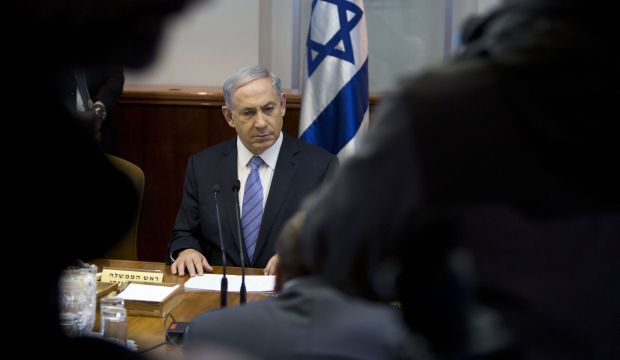
Israel's Prime Minister Benjamin Netanyahu attends the weekly cabinet meeting in his office in Jerusalem, on January 4, 2015. (Reuters/Oded Balilty/Pool)
Jerusalem, AP—Israeli leaders on Sunday threatened to take tougher action against the Palestinians over their decision to join the International Criminal Court, a day after freezing the transfer of more than 100 million US dollars in tax funds.
Last week’s Palestinian decision to seek membership in the international court has infuriated Israel. The Palestinians have said they intend on using their new membership in the Hague-based tribunal to press war crimes cases against Israel.
“The Palestinian Authority has chosen confrontation with Israel and we will not sit idly by,” Prime Minister Benjamin Netanyahu told his Cabinet. He said Israel would not allow its soldiers to be “hauled” before the international court.
The Palestinians submitted their application last week. It is expected to be approved in about 60 days, clearing the way for them to pursue war crimes cases against Israel.
The Palestinians have signaled they will pursue complaints over Israel’s policy of building settlements in occupied territories claimed by the Palestinians, as well as the Israeli military’s conduct during last summer’s war in the Gaza Strip.
In an initial response over the weekend, Israel said it had frozen 500 million shekels (more than 125 million dollars) in tax funds collected for the Palestinians. The monthly transfers are a key source of revenue for the cash-strapped Palestinian government.
Netanyahu’s government minister for strategic affairs, Yuval Steinitz, said Israel could take even tougher action.
“If the Palestinian Authority continues to attack us, I assume we will consider other steps,” he said, without elaborating.
Also Sunday, Israel’s Shin Bet security service said it arrested a Palestinian militant cell that drew inspiration from the Islamic State of Iraq and Syria (ISIS) extremist group. It said the cell was based in the West Bank city of Hebron and plotted shooting and bombing attacks. The cell had no formal ties to ISIS.
Meanwhile, Israel’s Supreme Court rejected an Israeli military plan to extend its West Bank separation barrier through a Palestinian village near Jerusalem. Residents in Battir had argued the structure would destroy ancient farming terraces. In June, the United Nations cultural agency UNESCO designated Battir a World Heritage site.
